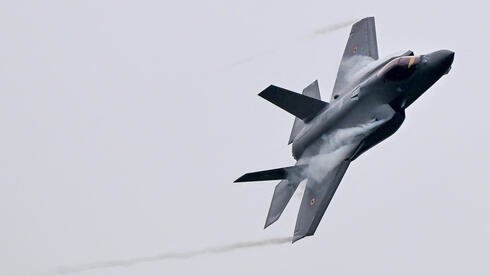
Israel’s F-35I ‘Adir’ Upgrades Fuel Debate as US Moves to Sell Lite F-35s to Saudi Arabia
Saudi purchase may proceed with downgraded jets, but Israel’s bespoke enhancements to its F-35 fleet remain unmatched
Israel’s advanced F-35I “Adir” fleet — long recognised as the region’s stealth benchmark — has drawn renewed global attention after a recent upgrade contract and fresh developments around potential U.S. sales of F-35s to Saudi Arabia.
The contrast underscores the depth of Israel’s aerial capabilities as well as enduring concerns over regional balance.
Under a newly awarded contract to the manufacturer, Israel is upgrading its F-35I “Adir” fleet to the latest Block 4 standard — a transformation described as “one of the most significant modernisation efforts to date”.
The enhancements include improved radar and electronic-warfare suites, extended range, and refined weapons integration, enabling deeper strike capability and higher survivability against advanced air-defence systems.
These features are part of what analysts say gives the “Adir” its distinctive edge.
What sets Israel’s version apart is not just the hardware, but its unique authorisation to integrate Israeli-developed avionics, mission systems, and electronic-warfare tools — enabling full customisation for its strategic environment.
The result, according to multiple defence analysts, is a stealth fighter optimised for long-range penetrations, high sortie rates and complex missions against adversaries possessing robust air-defence capabilities.
Meanwhile, the United States has moved forward with plans to sell F-35 stealth jets to Saudi Arabia under a newly revitalised U.S.–Saudi security agreement.
U.S. officials and defence experts have confirmed that the versions to be provided will be less advanced than those operated by Israel — lacking many of the custom modifications, software autonomy and advanced electronic-warfare capabilities that define the “Adir”.
This distinction is being maintained to protect what Washington describes as Israel’s “qualitative military edge” in the region.
Though the sale would mark a historic shift — Saudi Arabia could become the first Middle Eastern country besides Israel to field F-35s — military analysts and Israeli officials alike say the technical asymmetry ensures that the kingdom’s acquisition will not immediately close the gap.
Israel’s combination of superior platform customisation, combat-proven experience and operational infrastructure continues to give it a strategic advantage.
The unfolding developments highlight a delicate balancing act for U.S. policymakers: advancing strategic partnerships in the Gulf without eroding Israel’s long-standing security edge.
For Israel, the ongoing “Adir” enhancement programme reinforces its status as the only regional operator with deeply customised, combat-tested fifth-generation stealth fighters — and preserves a margin of superiority, even as competitors receive next-generation jets.
As Saudi Arabia advances toward potential F-35 delivery, the regional military balance will be watched closely — but for now, Israel’s upgraded F-35I remains the benchmark others can aspire to, rather than match.
The contrast underscores the depth of Israel’s aerial capabilities as well as enduring concerns over regional balance.
Under a newly awarded contract to the manufacturer, Israel is upgrading its F-35I “Adir” fleet to the latest Block 4 standard — a transformation described as “one of the most significant modernisation efforts to date”.
The enhancements include improved radar and electronic-warfare suites, extended range, and refined weapons integration, enabling deeper strike capability and higher survivability against advanced air-defence systems.
These features are part of what analysts say gives the “Adir” its distinctive edge.
What sets Israel’s version apart is not just the hardware, but its unique authorisation to integrate Israeli-developed avionics, mission systems, and electronic-warfare tools — enabling full customisation for its strategic environment.
The result, according to multiple defence analysts, is a stealth fighter optimised for long-range penetrations, high sortie rates and complex missions against adversaries possessing robust air-defence capabilities.
Meanwhile, the United States has moved forward with plans to sell F-35 stealth jets to Saudi Arabia under a newly revitalised U.S.–Saudi security agreement.
U.S. officials and defence experts have confirmed that the versions to be provided will be less advanced than those operated by Israel — lacking many of the custom modifications, software autonomy and advanced electronic-warfare capabilities that define the “Adir”.
This distinction is being maintained to protect what Washington describes as Israel’s “qualitative military edge” in the region.
Though the sale would mark a historic shift — Saudi Arabia could become the first Middle Eastern country besides Israel to field F-35s — military analysts and Israeli officials alike say the technical asymmetry ensures that the kingdom’s acquisition will not immediately close the gap.
Israel’s combination of superior platform customisation, combat-proven experience and operational infrastructure continues to give it a strategic advantage.
The unfolding developments highlight a delicate balancing act for U.S. policymakers: advancing strategic partnerships in the Gulf without eroding Israel’s long-standing security edge.
For Israel, the ongoing “Adir” enhancement programme reinforces its status as the only regional operator with deeply customised, combat-tested fifth-generation stealth fighters — and preserves a margin of superiority, even as competitors receive next-generation jets.
As Saudi Arabia advances toward potential F-35 delivery, the regional military balance will be watched closely — but for now, Israel’s upgraded F-35I remains the benchmark others can aspire to, rather than match.








